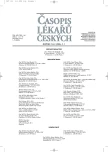-
Medical journals
- Career
The Use of Moderate Hypothermia in Neurosurgery
Authors: M. Smrčka; P. Fadrus; E. Neuman; R. Gál 1
Authors‘ workplace: Neurochirurgická klinika FN, Brno ; Anestesiologicko-resuscitaãní oddûlení FN, Brno 1
Published in: Čas. Lék. čes. 2005; 144: 19-23
Category: Review Article
Overview
Hypothermia is currently considered as the most effective neuroprotective method. In recent years hypothermia has been more and more applied in clinical conditions. Hypothermia has been used with promising results in severe head trauma where it can evidently decrease the intracranial pressure, improve cerebral perfusion pressure and by its direct neuroprotective effect it diminishes the secondary ischemic brain damage. Hypothermia has been widely used also during complicated neurosurgical operations when cerebral vessels are manipulated (operations of cerebral aneurysms, arteriovenous malformations, scull base tumours). Hypothermia has been recently tested also in some types of stroke, mainly in subarachnoid haemorrhage and ischaemic stroke.
Key words:
hypothermia, neurosurgery, neuroprotection.
Labels
Addictology Allergology and clinical immunology Angiology Audiology Clinical biochemistry Dermatology & STDs Paediatric gastroenterology Paediatric surgery Paediatric cardiology Paediatric neurology Paediatric ENT Paediatric psychiatry Paediatric rheumatology Diabetology Pharmacy Vascular surgery Pain management Dental Hygienist
Article was published inJournal of Czech Physicians

-
All articles in this issue
- Genetic Determinants of Osteoporosis
- DNA Microarrays – A Modern Method for Differential Gene Expression Analysis and its Significance for Cancer Diagnostics and Therapy
- The Use of Moderate Hypothermia in Neurosurgery
- C-reactive Protein in the Pathogenesis o Atherosclerosis: Advantage and Pitfalls of the „Mainz Hypothesis“
- Ten Years of Molecular Monitoring of Chronic Myeloid Leukemia by Quantitative RT-PCR
- Mechanical Cardiac Support – The First Use in Czech Republic
- Pilot Study of the Noninvasive Assessment of Endothelial Dysfunction by Post-occlusion Dopplerometry Velocity Curves Analysis in Arteria Brachialis
- Acute Oesophageal Necrosis
- Physical Exercise and Yoga in Prevention and Treatment of Addictive Diseases
- A Glance into History of Angiology in Central Europe
- Journal of Czech Physicians
- Journal archive
- Current issue
- Online only
- About the journal
Most read in this issue- Acute Oesophageal Necrosis
- Genetic Determinants of Osteoporosis
- DNA Microarrays – A Modern Method for Differential Gene Expression Analysis and its Significance for Cancer Diagnostics and Therapy
- C-reactive Protein in the Pathogenesis o Atherosclerosis: Advantage and Pitfalls of the „Mainz Hypothesis“
Login#ADS_BOTTOM_SCRIPTS#Forgotten passwordEnter the email address that you registered with. We will send you instructions on how to set a new password.
- Career

